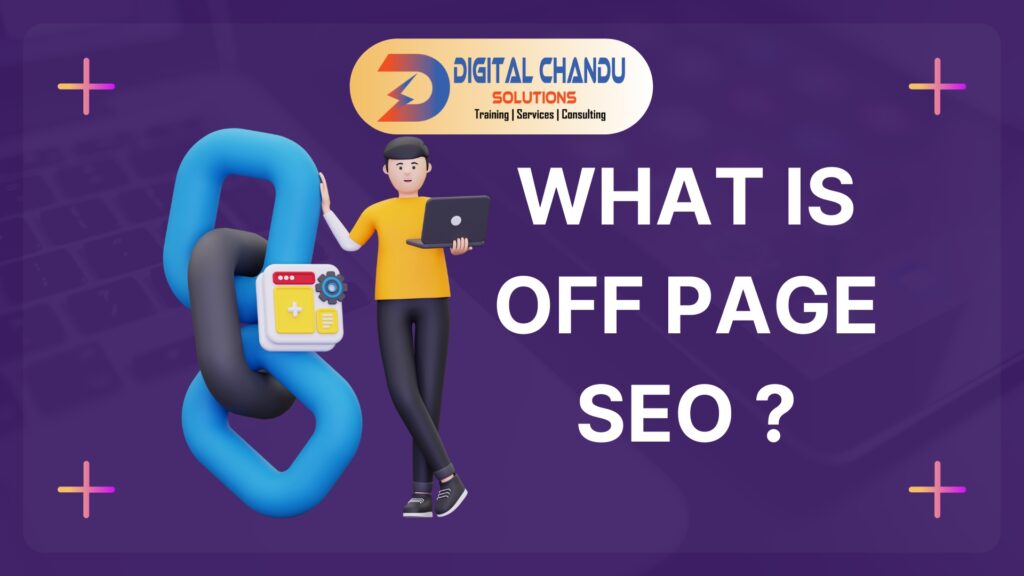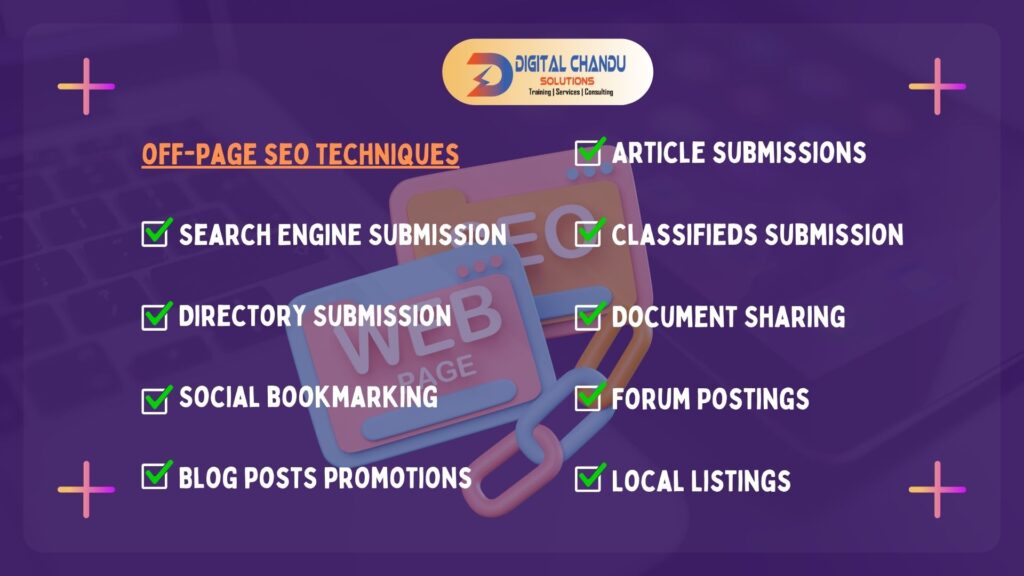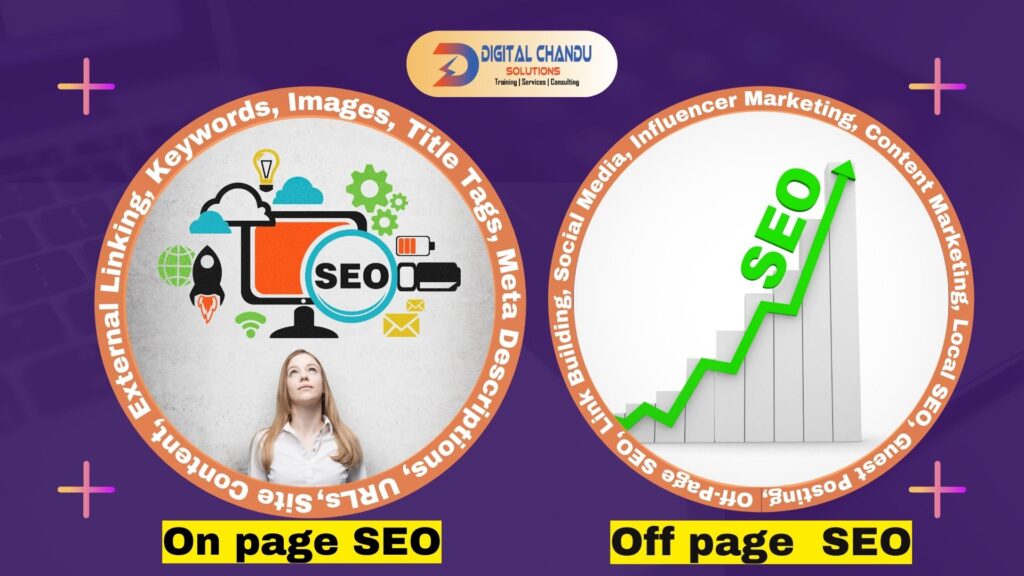Understanding Off-Page SEO: A Comprehensive Guide to Boosting Your Online Presence
In the vast and ever-evolving digital marketing landscape, search engine optimization (SEO) is a fundamental pillar for enhancing online visibility, attracting organic traffic, and ultimately driving business success. While many are familiar with the concept of on-page SEO, which involves optimizing elements within a website to improve its search engine rankings, off-page SEO plays an equally crucial role in shaping a website’s authority, relevance, and overall visibility.
What is Off-Page SEO?
Off-page SEO refers to the strategies and techniques used to improve a website’s search engine rankings and visibility through activities outside of the website itself. Unlike on-page SEO, which focuses on optimizing content, meta tags, and site structure, off-page SEO revolves around building a solid online reputation, acquiring quality backlinks, and engaging with external audiences and platforms.

Why is Off-Page SEO Important?
Off-page SEO is essential because it signals to search engines like Google that your website is reputable, trustworthy, and relevant within its industry or niche. By implementing effective off-page SEO strategies, you can:
Boost Search Engine Rankings: Quality backlinks from reputable websites are a significant ranking factor for search engines. Off-page SEO helps improve your website’s authority, which can lead to higher rankings in search engine results pages (SERPs).
Increase Organic Traffic: Higher rankings and improved visibility translate to increased organic traffic from users actively searching for relevant information, products, or services related to your website.
Enhance Online Reputation: Off-page SEO activities, such as favorable reviews, mentions from influencers, and social media engagement, contribute to building a positive online reputation for your brand or business.
Build Brand Authority: Establishing a solid presence across external platforms and earning backlinks from industry-relevant sources can position your brand as an authority within your niche, fostering trust and credibility among your target audience.
Critical Strategies for Off-Page SEO Success
1. Link Building
a. Quality Over Quantity
One of the cornerstones of off-page SEO is link building, which involves acquiring backlinks from other websites to your own. However, it’s crucial to prioritize quality over quantity when building backlinks. Focus on earning links from authoritative, relevant, and trustworthy websites within your industry or niche.
b. Natural Link Acquisition
Avoid spammy or manipulative tactics to obtain backlinks, as search engines penalize such practices. Instead, focus on creating valuable, shareable content that naturally attracts backlinks from reputable sources.
2. Social Media Engagement
a. Amplifying Your Reach
Active engagement on social media platforms is not only beneficial for brand awareness but also contributes to off-page SEO. Likes, shares, comments, and social mentions signal search engines that your content is valuable and resonates with your audience.
b. Building Social Signals
Social signals, such as the number of followers, likes, shares, and comments on your social media posts, can indirectly impact your website’s SEO performance. Aim to create engaging, shareable content that encourages social interaction and sharing.

3. Online Reputation Management
a. Monitoring and Responding
Maintaining a positive online reputation is essential for off-page SEO success. Monitor online mentions, reviews, and comments about your brand or business, and respond promptly and professionally to address any concerns or feedback.
b. Encouraging Positive Reviews
Encourage satisfied customers to leave positive reviews on review platforms, Google My Business, and social media. Positive reviews enhance your online reputation and contribute to local SEO efforts.
4. Content Marketing
a. Creating Valuable Content
By attracting organic backlinks and social shares, content marketing is vital in off-page SEO as it attracts. Create high-quality, informative content such as blog posts, articles, infographics, videos, and guides that address your audience’s needs and interests.
b. Guest Blogging
Collaborate with industry influencers and reputable websites through guest blogging opportunities. Contributing valuable content to external platforms enables you to reach new audiences, establish thought leadership, and earn quality backlinks.
5. Local SEO Strategies
a. Optimizing Local Listings
For businesses targeting local audiences, optimizing your presence on local directories, Google My Business, and map listings is crucial. Ensure consistent NAP (Name, Address, Phone Number) information across all platforms and encourage customer reviews and feedback.
b. Localized Content
Create localized content that caters to your local audience’s specific needs and interests. Address local events, news, and trends to enhance relevance and visibility in local search results.
6. Influencer Collaboration
a. Leveraging Influencer Partnerships
Partnering with influencers and industry experts can amplify your brand’s reach, credibility, and visibility. Collaborate with influencers to promote your products, services, or content to their followers and gain valuable social proof and backlinks.
b. Building Relationships
Focus on building genuine relationships with influencers based on mutual trust and respect. Provide value, engage with their content, and offer meaningful collaborations that benefit both parties and their respective audiences.
The Future of Off-Page SEO
As the digital landscape evolves, off-page SEO will remain critical to any comprehensive digital marketing strategy. Embracing emerging trends such as voice search optimization, video content marketing, and AI-driven personalization can further enhance On-page SEO and off-page SEO, which are two essential components of search engine optimization (SEO) that work together to improve a website’s visibility, relevance, and rankings on search engine results pages (SERPs). Understanding the critical differences between these two aspects is crucial for developing a comprehensive SEO strategy. Here’s a breakdown of the differences between on-page and off-page SEO:
What is difference between On page SEO & Off page SEO
On-Page SEO:
Definition: On-page SEO refers to the optimization tactics and strategies implemented directly on your website to improve its rankings.
Focus Areas: It primarily focuses on optimizing elements such as content, meta tags, HTML tags, site structure, internal links, page speed, mobile responsiveness, and keyword usage within the website.
Examples: Creating high-quality and relevant content, optimizing title tags and meta descriptions, using descriptive URLs, adding alt text to images, improving site navigation, implementing schema markup, and ensuring mobile-friendly design are all part of on-page SEO.
Benefits: On-page SEO helps search engines understand the relevance and context of your website’s content, making it easier to index and rank your pages for relevant search queries.

Off-Page SEO:
Definition: Off-page SEO refers to optimization efforts outside your website, focusing on building authority, credibility, and relevance through external factors.
Focus Areas: It includes link building, social media engagement, online reputation management, influencer collaborations, guest blogging, local SEO tactics, and community engagement.
Examples: Acquiring backlinks from reputable websites, engaging with users on social media platforms, managing online reviews and brand mentions, partnering with influencers, optimizing local business listings, and participating in industry forums are all part of off-page SEO.
Benefits: Off-page SEO enhances your website’s authority, trustworthiness, and visibility by building a solid external reputation and attracting organic traffic from various sources.
Key Differences:
Location: On-page SEO occurs directly on your website, while off-page SEO occurs outside your website on external platforms and channels.
Focus: On-page SEO focuses on optimizing internal factors within your website, such as content and HTML elements, while off-page SEO emphasizes building external factors like backlinks and social signals.
Control: You have more control over on-page SEO elements within your website’s domain, whereas off-page SEO relies on external factors that may require outreach and relationship-building efforts.
Impact: On-page SEO influences how search engines understand and rank your website’s pages, while off-page SEO influences your overall website’s authority, credibility, and visibility across the internet.
Both on-page and off-page SEO are integral parts of a successful SEO strategy, and they work synergistically to improve your website’s search engine rankings, organic traffic, and online presence. Your off-page SEO efforts drive sustainable growth and success for your website or business.
Digital Chandu Solutions
Digital Chandu Solutions is a leading provider of top-notch training and services in the field of SEO, specializing in both on-page and off-page optimization techniques.

On-Page SEO :
Our on-page SEO services at Digital Chandu Solutions are designed to optimize every aspect of your website to improve its search engine rankings and user experience. We optimize content quality, meta tags, keyword placement, site structure, internal linking, and mobile responsiveness. By implementing best practices in on-page SEO, we help your website attract organic traffic, increase visibility, and achieve higher search engine rankings.
Off-Page SEO :
At Digital Chandu Solutions, we excel in off-page SEO strategies that enhance your website’s authority, credibility, and online presence. Our services include:
- Building high-quality backlinks from reputable websites.
- Engaging in social media promotion and community engagement.
- Managing online reputation and brand mentions.
- Leveraging influencer collaborations.
Our comprehensive off-page SEO approach ensures that your website gains valuable external signals that boost its rankings and attract targeted traffic.
Digital Chandu Solutions offers cutting-edge training and services in both on-page and off-page SEO, empowering businesses to optimize their websites effectively, improve search engine rankings, and achieve long-term success in the digital landscape.
FAQ’S
What is off-page SEO?
Off-page SEO refers to optimization techniques and strategies implemented outside your website to improve its search engine rankings and online visibility. It includes link building, social media engagement, influencer collaborations, and online reputation management.
Why is off-page SEO important?
Off-page SEO is crucial because it helps build your website’s authority, credibility, and trustworthiness in the eyes of search engines like Google. Quality backlinks from reputable sites, positive brand mentions, and social media signals improve your site’s rankings and attract organic traffic.
What are backlinks, and why are they essential for off-page SEO?
Backlinks are incoming links from other websites to your site. They are essential for off-page SEO because search engines view backlinks as “votes of confidence” and use them to determine a website’s authority and relevance. Quality backlinks from authoritative sites can significantly impact your search engine rankings.
How can I build backlinks for my website?
You can build backlinks through various strategies such as guest blogging, submitting your site to reputable directories, participating in industry forums and communities, creating shareable content, and engaging with influencers and bloggers in your niche. Focusing on acquiring natural and high-quality backlinks is essential rather than using spammy tactics.
What role does social media play in off-page SEO?
Social media platforms play a significant role in off-page SEO by providing opportunities to engage with your audience, promote your content, and attract social signals such as likes, shares, and comments. An active social media presence can increase brand visibility, traffic, and potential backlinks.
How does online reputation management tie into off-page SEO?
Online reputation management involves monitoring and managing your brand’s reputation across various online channels. Positive reviews, testimonials, and mentions contribute positively to your off-page SEO efforts, while addressing negative feedback promptly and professionally can help mitigate reputational damage and improve your brand’s image.
Is local SEO considered part of off-page SEO?
Local SEO strategies such as optimizing your Google My Business listing, acquiring local citations, managing customer reviews, and targeting location-specific keywords are part of off-page SEO. These tactics help improve your visibility in local search results and attract geographically-relevant traffic to your website.
How long does it take to see results from off-page SEO efforts?
The timeline for seeing results from off-page SEO can vary depending on factors such as the competitiveness of your industry, the quality of your backlinks, and the consistency of your efforts. Generally, observing noticeable improvements in your search engine rankings and organic traffic may take several weeks to months.
What are some common mistakes to avoid in off-page SEO?
Common mistakes to avoid in off-page SEO include:
- Using black hat tactics such as buying low-quality backlinks.
- Engaging in link schemes.
- Spamming forums or comment sections.
- Refrain from neglecting the importance of natural and relevant link-building.
Focusing on ethical and sustainable off-page SEO practices is essential for long-term success.
How can I measure the effectiveness of my off-page SEO efforts?
You can measure the effectiveness of your off-page SEO efforts using tools such as Google Analytics, Google Search Console, and SEO monitoring platforms. Track metrics such as organic traffic, keyword rankings, backlink profile, social media engagement, and online mentions to evaluate the impact of your off-page optimization strategies.

